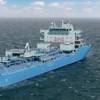Shipping income tax reform may be one of the key legislative initiatives in the U.S. Congress this year according to Michael G. Roberts, who holds down the Washington D.C. office of Crowley Maritime Corporation. Roberts noted it has been almost three years since the Maritime Security Act (MSP) was passed, giving 47 U.S.-flagged ships a new lease on life through a non-permanent operating subsidy program.
Now, he says, something must be done about the threatened extinction of American shipping firm operating vessels in international trade. Roberts said, according to data compiled by the U.S. Maritime Administration (MarAd), American liner carriers' share of the market for moving US import and export cargoes fell by almost half between 1990 and 1996 - from greater than 17 percent of the market in 1990, to less than 9 percent in 1996. That, said Roberts, is "a huge and precipitous drop," adding U.S. carriers' share of non-liner cargoes is even worse, possibly as low as the one to three percent range.
"We can assess the strength of American shipping companies not only on the basis of our share of the cargo market, but also based on the vessel capacity we own or operate," said Roberts. "We know the U.S. flag fleet operated in international trades has been in long-term decline. It is approaching the 47 ships in the MSP, and it will likely expand only if and when the government decides to expand MSP."
Roberts also said the amount of U.S. controlled tonnage flying foreign flags of convenience is in decline.
"We all want to see as many ships as possible flying the U.S. flag and manned by U.S. crews," he said, "but until we are able to eliminate the huge cost advantages available to flag-of-convenience vessels, we have to fully reconcile ourselves to the fact U.S. carriers must have the same ability to operate flag-of-convenience vessels as do our foreign competitors."
According to Roberts, U.S. carriers owned approximately 22 million of the 85 million gross registered tons in the world flag-of-convenience fleet in 1975. By 1996, the world flag-of-convenience fleet had almost tripled, to 241 million tons, but U.S. carrier ownership fell almost by half, or one-fifth the level it was in 1975. Although he said there were a number of factors for the U.S. fall-off, he singled out current U.S. tax laws on shipping as being the most identifiable.
"American carriers pay income tax at a base rate of 36 percent," he said. "Most foreign carriers pay little or no income tax."
Roberts said an in-house analysis carried out by Crowley covering the actual financial statements of nine liner carriers - three American and six foreign - showed, on average, the foreign carriers sampled got a net tax credit in 1996 while the American carriers paid more than 45 percent of their profits to the government. In 1997 it was about 7 percent foreign tax liability versus 43 percent for the Americans.
"In short," said Roberts, "it is the income tax disadvantage, more than any other factor I can identify, that explains the current condition of the American shipping industry."
Looking for a solution, the Crowley executive said most of the attention over the past year has centered around restoring Subpart F tax deferral, which until 1986 provided a means for American carriers to defer their income tax liability on shipping income earned using foreign-flag vessels. Roberts said legislation had been introduced into Congress in the last session that would have restored the Subpart F exemption, and also improve on it by allowing tax deferred money to be invested in U.S. flag shipping.
A variation on this approach, which has broad, but not unanimous support in the industry, would not just allow, but require such reinvestment as a condition for receiving tax deferral on some or all of the foreign flag earnings. Still another approach would not involve Subpart F at all, but would simply adjust the income tax rates of American shipping companies engaged exclusively in international trade to match the average tax rates of foreign competitors.
Roberts said he couldn't suggest a specific solution, but expressed hope the top leadership of the maritime industry - primarily seagoing unions and shipping companies - make a concentrated effort over the next several months to come to an agreement on the solution.
"It took a long time, but the entire industry eventually came together over MSP and we got a program that has helped insure the survival of American mariners," he said. "Now we need to make the same commitment to ensure the survival of American shipping companies."-J.L. Shaw
Sponsored Content
Innovative Hull Maintenance: Profitable & Green

Subscribe for
Maritime Reporter E-News
Maritime Reporter E-News is the maritime industry's largest circulation and most authoritative ENews Service, delivered to your Email five times per week













